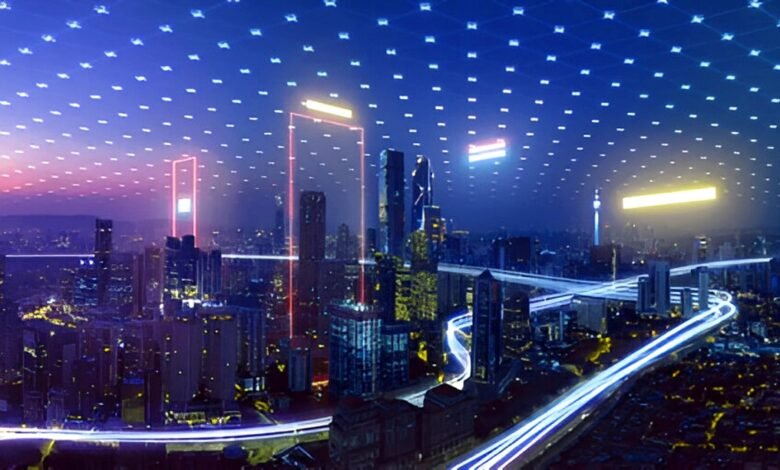
As urban populations surge and the demand for sustainable living intensifies, countries around the globe are investing in smart technologies to modernize infrastructure. Pakistan, too, is stepping onto the global stage with its strategic push toward building smart cities. Smart cities are emerging in Pakistan not just as a futuristic concept but as a concrete plan to revolutionize urban living.
This article explores how Pakistan is transforming its urban landscape, the technologies driving this shift, and the social and economic implications of this transformation.
What is a Smart City?
A smart city integrates digital technologies into urban management to improve efficiency, connectivity, sustainability, and quality of life. Through IoT (Internet of Things), AI (Artificial Intelligence), data analytics, and cloud computing, these cities automate public services, enhance security, manage traffic flow, and monitor utilities.
For Pakistan, where urbanization is growing rapidly, this transition is critical. From smart traffic management systems to energy-efficient buildings, the goal is to create livable, sustainable, and technologically advanced cities.
Why Smart Cities Are Essential for Pakistan
Rapid Urbanization
Pakistan’s urban population is expected to reach 50% by 2040. Cities like Karachi, Lahore, and Islamabad are already struggling with traffic congestion, pollution, and overstressed infrastructure. Smart city solutions can alleviate these issues by improving urban planning, transportation systems, and waste management.
Energy Efficiency and Sustainability
Energy crises are a recurring challenge in Pakistan. Smart cities utilize renewable energy sources, smart grids, and real-time monitoring systems to optimize energy usage. This ensures both sustainability and cost-efficiency in the long run.
Boosting Economic Growth
Smart cities create a fertile environment for tech startups, foreign investments, and job creation. As smart infrastructure in Pakistan develops, it opens doors for new markets and digital entrepreneurship, fostering economic development.
Government Initiatives Driving Smart City Development
Digital Pakistan Vision
Launched in 2019, the Digital Pakistan initiative lays the groundwork for smart cities by enhancing internet connectivity, promoting digital literacy, and encouraging public-private partnerships. Under this vision, Pakistan aims to digitize public services and make technology accessible nationwide.
Smart City Projects Underway
-
Islamabad Smart City
This is Pakistan’s first officially recognized smart city. Developed with international collaboration, it integrates smart security, energy, and transport systems, offering a model for future cities. -
Lahore Smart City
As Pakistan’s second smart city, it focuses on modern residential and commercial zones, 5G connectivity, and eco-friendly urban planning. It’s also attracting tech-savvy investors and homeowners. -
Karachi Transformation Plan
While not fully smart yet, Karachi’s transformation includes initiatives like smart surveillance systems, public transport digitization, and AI-based waste management.
Technologies Powering Smart Cities in Pakistan
Internet of Things (IoT)
IoT devices are the backbone of smart infrastructure. From smart streetlights that save energy to real-time traffic monitoring, IoT enables the seamless integration of technology into everyday life.
Artificial Intelligence and Big Data
AI and data analytics help in predictive modeling for disaster management, healthcare services, and urban mobility. AI-driven platforms can detect traffic bottlenecks or predict energy demand fluctuations.
Blockchain and Digital Identity
To ensure secure transactions and governance, smart cities are integrating blockchain technology. For instance, e-governance portals use blockchain to manage land records, licenses, and citizen identities securely and transparently.
Role of Public-Private Partnerships
The success of smart cities in Pakistan hinges on collaboration. Public-private partnerships (PPPs) have been instrumental in funding infrastructure and providing tech support. Tech companies like Huawei, Nokia, and local startups are working with government bodies to implement smart solutions for traffic control, pollution monitoring, and digital healthcare.
Smart Transportation Solutions
One of the most visible signs that smart cities are emerging in Pakistan is the evolution of urban mobility.
-
Lahore Metrobus and Karachi Green Line BRT are examples of semi-automated transit systems that use sensors and digital ticketing.
-
Ride-hailing apps like Careem and Bykea are incorporating AI for route optimization.
-
Smart traffic lights, monitored by centralized systems, are reducing congestion in pilot zones.
Digital Governance and E-Services
A key feature of smart cities is the digitization of government services. Citizens in smart cities can:
-
Pay bills online
-
File complaints via apps
-
Track public services in real time
-
Access e-health and e-education platforms
Cities like Islamabad are already offering online municipal services, showcasing how smart cities in Pakistan are simplifying governance.
Green Urban Planning and Smart Architecture
Eco-Friendly Housing Societies
Lahore and Islamabad are now home to housing societies with solar panels, rainwater harvesting systems, and green rooftops. These initiatives reduce carbon footprints and promote sustainable urban living.
Smart Buildings
Buildings equipped with sensors for temperature control, lighting, and security are becoming increasingly common. These buildings not only enhance comfort but also reduce energy bills.
Cybersecurity and Data Privacy Concerns
As Pakistan progresses, cybersecurity becomes a priority. With so much data collected via sensors, cameras, and mobile apps, protecting citizen privacy is crucial. The government is drafting legislation to safeguard digital identities, prevent hacking, and enforce data protection laws.
Challenges to Smart City Development in Pakistan
Despite progress, several hurdles remain:
-
Lack of infrastructure funding
-
Cybersecurity vulnerabilities
-
Resistance to digital adoption
-
Uneven development between rural and urban areas
-
Limited digital literacy in older populations
However, initiatives to expand digital education and promote tech awareness are already addressing some of these gaps.
The Future of Smart Cities in Pakistan
By 2030, multiple cities in Pakistan are expected to meet global smart city standards. Investments in fiber optic networks, public Wi-Fi, electric vehicle (EV) infrastructure, and AI-powered governance are laying the foundation for this transformation.
The long-term goal is to establish interconnected, self-sustaining cities where everything from public safety to waste management is automated, efficient, and eco-conscious.
Conclusion
There’s no denying the fact that smart cities are emerging in Pakistan with unprecedented momentum. Fueled by technological innovation, strategic planning, and visionary leadership, Pakistan is poised to redefine urban living.
From Lahore Smart City to Islamabad’s integrated systems, the country is embracing digital transformation in urban development. While challenges remain, the ongoing efforts by the government, private sector, and civil society are driving a smart, sustainable future for Pakistan’s cities.
As we move deeper into 2025, it’s clear that smart urban ecosystems are no longer just an idea—they are a necessity. Smart cities are emerging in Pakistan not just for convenience but as a blueprint for progress.











